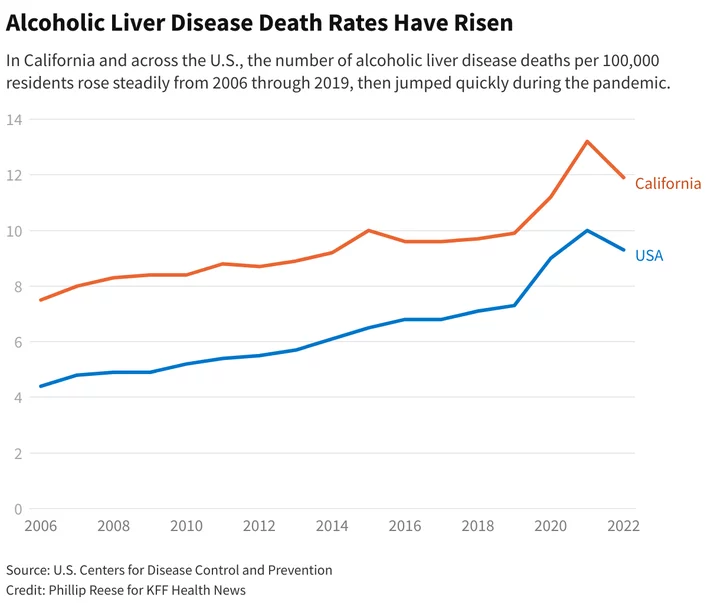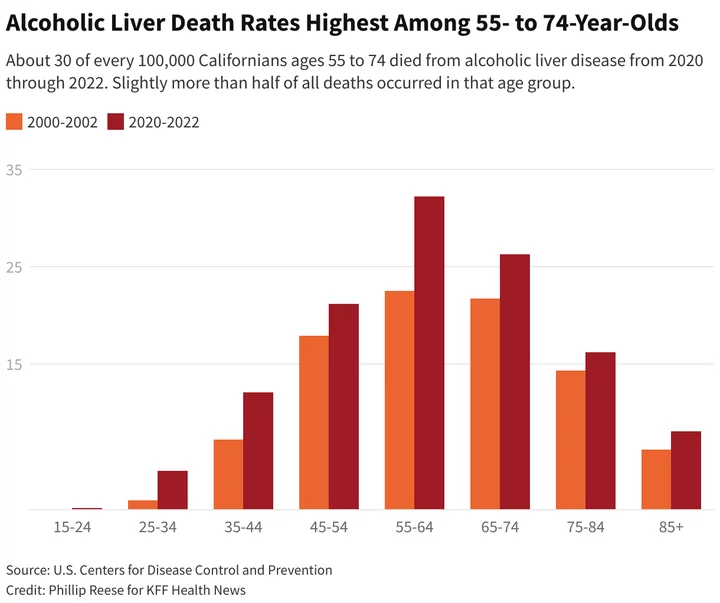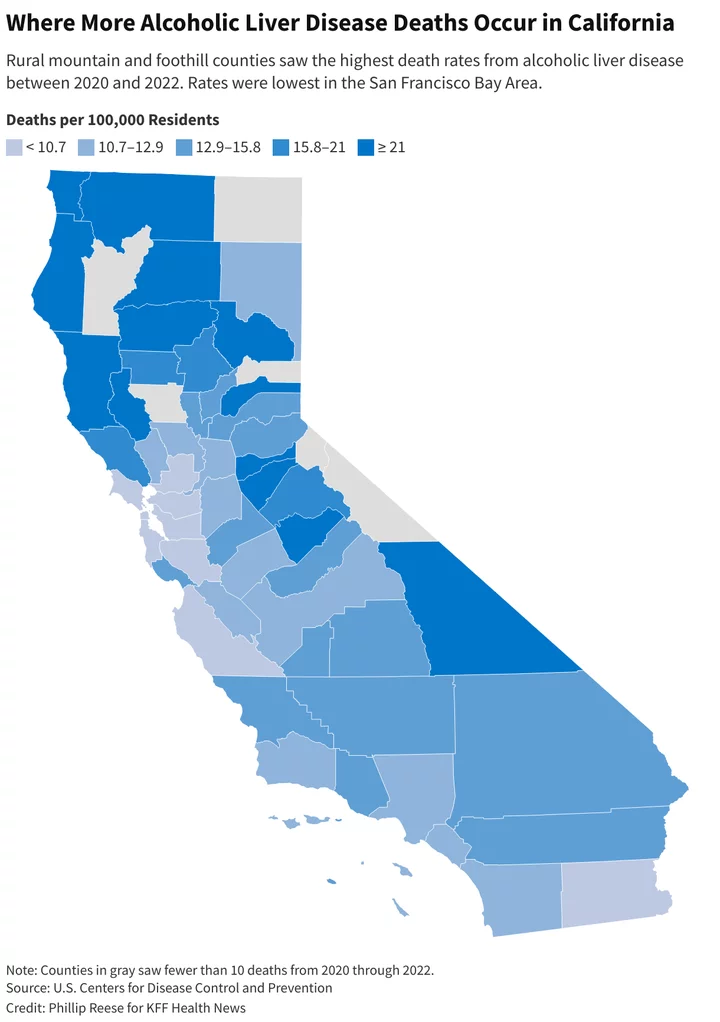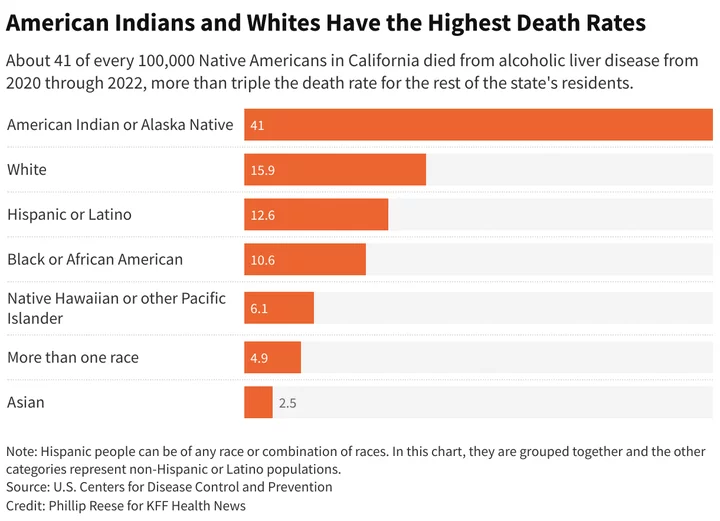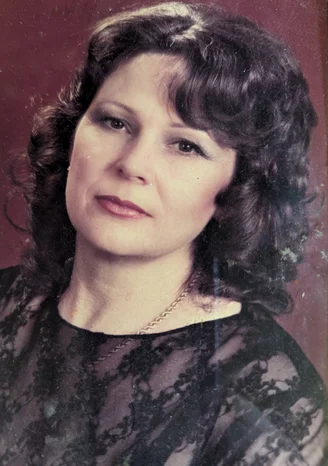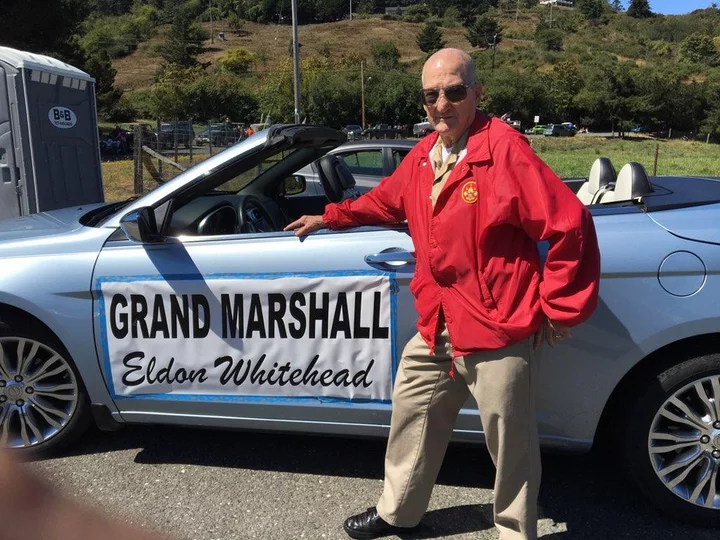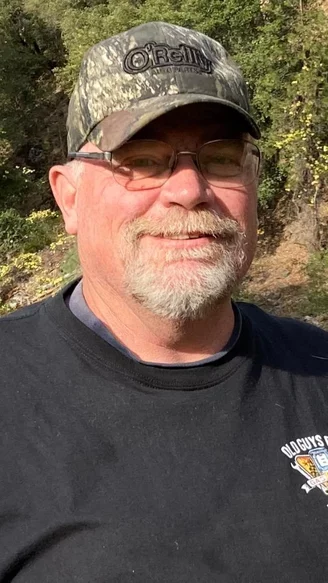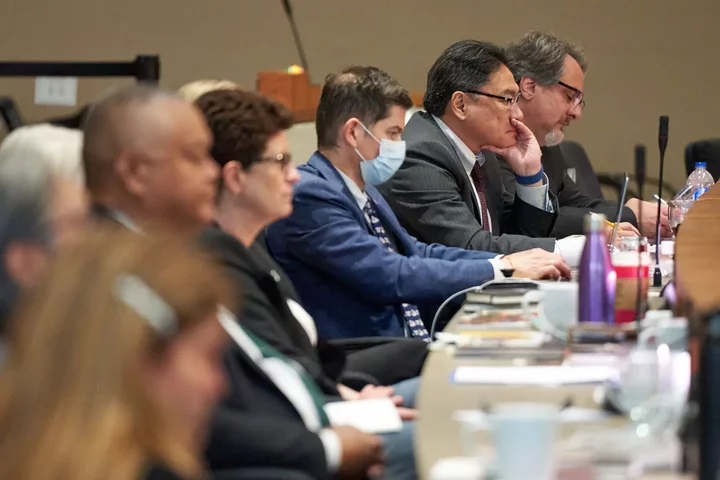Excessive Drinking During the Pandemic Increased Death Rates From Alcoholic Liver Disease — Especially in Humboldt
Phillip Reese / Tuesday, July 18, 2023 @ 8:57 a.m. / Health
Excessive drinking during the COVID-19 pandemic increased alcoholic liver disease deaths so much that the condition killed more Californians than car accidents or breast cancer, a KFF Health News analysis has found.
Lockdowns made people feel isolated, depressed, and anxious, leading some to increase their alcohol intake. Alcohol sales rose during the pandemic, with especially large jumps in the consumption of spirits.
While this led to a rise in all sorts of alcohol-related deaths, the number of Californians dying from alcoholic liver disease spiked dramatically, with 14,209 deaths between 2020 and 2022, according to provisional data from the Centers for Disease Control and Prevention.
Alcoholic liver disease is the most common cause of alcohol-induced deaths nationally. In California, the death rate from the disease during the last three years was 25% higher than in the three years before the pandemic. The rate peaked at 13.2 deaths per 100,000 residents in 2021, nearly double the rate from two decades ago.
The disease is usually caused by years of excessive drinking, though it can sometimes occur after a short period of heavy alcohol use. There are often no symptoms until late in the disease, when weakness, confusion, and jaundice can occur.
Many who increased their drinking during the pandemic were already on the verge of developing severe alcoholic liver disease, said Jovan Julien, a postdoctoral researcher at Harvard Medical School. The extra alcohol sped up the process, killing them earlier than they would have otherwise died, said Julien, who co-wrote a modeling study during the pandemic that predicted many of the trends that occurred.
Even before the pandemic, lifestyle and dietary changes were contributing to more deaths from alcoholic liver disease, despite little change in alcohol sales, said Brian Lee, a hepatologist and liver transplant specialist with Keck School of Medicine of the University of Southern California.
Lee and other researchers found a connection between alcoholic liver disease and metabolic syndrome, a condition often characterized by excess body fat around the waist. Metabolic syndrome — often caused by poor diet and an inactive lifestyle — has risen across the country.
“Having metabolic syndrome, which is associated with obesity, high blood pressure, and diabetes, more than doubles your risk of having advanced liver disease at the same level of drinking,” Lee said.
The Californians alcoholic liver disease most often kills are those between 55 and 74 years old. They make up about a quarter of the state’s adults but more than half the deaths from alcoholic liver disease.
However, death rates among Californians 25 to 44 roughly doubled during the last decade. About 2,650 Californians in that age group died of the disease during the last three years, compared with 1,270 deaths from 2010 through 2012.
“People are drinking at earlier levels,” Lee said. “People are developing obesity at younger ages.”
The highest death rates from alcoholic liver disease occur in rural eastern and Northern California. In Humboldt County, for instance, the death rate from alcoholic liver disease is more than double the statewide rate.
Jeremy Campbell, executive director of Waterfront Recovery Services in Eureka, said Humboldt County and other rural areas often don’t have the resources and facilities to address high rates of alcohol use disorder. His facility provides high-intensity residential services and uses medication to get people through detox.
“The two other inpatient treatment facilities in Eureka are also at capacity,” he said. “This is just a situation that there’s just not enough treatment.”
Campbell also pointed to the demographics of Humboldt County, which has a much higher proportion of white and Native American residents than the rest of the state. Alcoholic liver disease death rates in California are highest among Native American and white residents.
Death rates rose more among Native American, Latino, Asian, and Black Californians during the last decade than among non-Latino white Californians, CDC data shows. Part of that is due to disparities in insurance coverage and access to care, said Lee. In addition, Lee said, rates of metabolic syndrome have increased more quickly among nonwhites than among whites. Racial health disparities also manifest in differing survival rates for Black and white patients after liver transplants, he added.
The trend is expected to continue. Julien projects a temporary dip in deaths because many people who would have died of the disease in 2022 or 2023 instead died sooner, after a boost in drinking during the pandemic, but that deaths will rise later as bad habits developed during the pandemic begin to take a long-term toll.
“As people increased their consumption during covid-19, we have more folks who have now initiated alcohol use disorder,” Julien said.
###
Phillip Reese is a data reporting specialist and an assistant professor of journalism at California State University-Sacramento.
This article was produced by KFF Health News, which publishes California Healthline, an editorially independent service of the California Health Care Foundation. KFF Health News is a national newsroom that produces in-depth journalism about health issues and is one of the core operating programs at KFF—an independent source of health policy research, polling, and journalism. Learn more about KFF.
BOOKED
Today: 4 felonies, 8 misdemeanors, 0 infractions
JUDGED
Humboldt County Superior Court Calendar: Today
CHP REPORTS
No current incidents
ELSEWHERE
Governor’s Office: El Gobernador Newsom presenta su último discurso sobre el Estado del Estado, honrando al pasado de California y reafirmando un futuro más brillante para todos
County of Humboldt Meetings: Behavioral Health Board Executive Committee Meeting - Nov. 5, 2025
Governor’s Office: One year after Los Angeles firestorms, California continues statewide recovery and behavioral health support
OBITUARY: Rosemary ‘Rose’ Ellen Hunter, 1942-2023
LoCO Staff / Tuesday, July 18, 2023 @ 6:56 a.m. / Obits
Rosemary “Rose” Ellen Hunter — 80, of Eureka — passed
peacefully after a long illness Saturday July 1, 2023. The world is a
lesser place for the absence of her beauty, her humor and indominable
spirit.
Rose was born September 9, 1942, in Snowflake, Arizona, daughter to Charles E. “Charlie” and Nedra Akers Barton.
She was equally at home “pulling” a stubborn calf, canning fresh caught salmon, sewing without patterns, weaving a delicate basket fashioned after her beloved indigenous friends or dressed to the nines attending a more formal function.
Rose was a long-time member of the Humboldt Gem & Mineral Society and known for her knowledge and love of “rocks.”
She was a long-time devotee of the Clarke Historical Museum, where she used her extensive knowledge of native basketry to care for the museum’s large basket collection. Rose was curator of Naelis Hall – Native American History, as well as serving on the Board of Directors for many years. She also collected vintage hats, restored them and gave educational presentations (infused with her special humor) explaining the history and use of each hat.
Rosemary was preceded in death by her parents, daughter Angela Faustino, brother Charles Vernon Barton, sisters Dorothy Bright and Patricia Barton, and her beloved husband William “Bill” Hunter.
She is survived by:
Siblings: James W. “Jim” Barton and his wife Darlene, and sister Alice McCoy.
Her children Schelina Rose Estevo, John Curtis Perkins III, Ralph “Craig” Perkins and his wife Darla, and Manuel Chester “Tino” Faustino.
Grandchildren: Curtis Estevo and his wife Erin, Diane Estevo Bulicek and her husband Matt, Janell Perkins Mathews, Peyton Perkins, Paige Perkins, Rigel Perkins, Christopher Perkins, Westen Wratchford, Reya Wratchford, Brook Faustino, & Autumn Rose Faustino.
Great-grandchildren: Curtis Estevo Jr., McKenzie Estevo, Lucy Rose Perkins, Jasper Allen Flanagan-Hall and Isabella “Bella” Rose Wratchford
Many nieces, nephews and loving friends.
In lieu of flowers, please consider contributions to the Clarke Historical Museum in Rosemary’s memory, 240 E. St., Eureka, CA 95501.
A celebration will be held July 22, 2 p.m. at the Pine Hill Baptist Church, 4675 Union Street, Eureka, CA 95503.
Please come prepared with a story or memory to share as we celebrate the life of this amazing woman. The celebration will continue with food and fellowship at the church.
###
The obituary above was submitted on behalf of Rose Hunter’s loved ones. The Lost Coast Outpost runs obituaries of Humboldt County residents at no charge. See guidelines here. Email news@lostcoastoutpost.com.
OBITUARY: Eldon Whitehead, 1940-2023
LoCO Staff / Tuesday, July 18, 2023 @ 6:56 a.m. / Obits
Eldon Garvis Whitehead, age 83, passed away peacefully on July 9, 2023 due to heart failure. He was born January 1, 1940 in Memphis, Texas to Ira and Nellie Whitehead.
Eldon graduated from Live Oak High School in 1958. After graduating he moved to Humboldt County and went to work for the US Forest Service. In May 1959 he quit the Forest Service and went to work for the Pacific Lumber Company, starting out in the by-products division. He moved up to the main office in 1961 as the mail delivery person and shortly after that he began his position as an logging accountant. In 1993 he retired from Pacific Lumber Company after 34 years. He later found interest in security and went to work part-time for Pacific Coast Security as a security guard. He also was a volunteer campus security officer at Fortuna High.
In 1967 he married his first wife, Frances Gilmore. They lived in Scotia for 27 years before moving to Fortuna in the house they had custom-built. He and Frances were married for 46 years until her passing in 2012. Eldon went on to remarry his second wife, Margaret Shrull (Maggie). He and Maggie were married for six years until her unexpected passing in 2021. Eldon was involved in so many organizations. He served as a board member on Scotia Elementary and Fortuna High. He was active in the Scotia/Rio Dell Chamber of Commerce and was voted Grand Marshall at Wildwood Days in 2016. Eldon was a volunteer firefighter for Scotia Fire Department and served as treasurer for several years. Eldon was involved in the Kiwanas in both Scotia and Fortuna. He was a devoted scout master and spent countless hours scouting. Eldon and his first wife were foster parents, fostering more then 250 children over 35 years. In 2016 they received the Foster Parents of the Year. Eldon also volunteered his time at the voting polls over the years. He was always involved or volunteering his time is so much throughout Humboldt County.
His interest knowledge and dedication in the area was remarkable. He had a passion for history of Scotia and surrounding areas.Many refer to him as a true historian.He had several Facebook pages and shared posts and photographs for his friends to enjoy.
Eldon is described by his family, friends and coworkers as hardworking, a devoted husband, father, grandfather and friend. A truly one of a kind that will be missed and forever in our hearts.
Eldon is survived by seven children, 15 grandchildren, 27 great-grandchildren, 12 great-great-grandchildren and his brother Glen.
Eldon is preceded in death by Ira and Nellie Whitehead (parents), Frances (wife), Maggie (second wife), Carol Brown (daughter), Gabriel Merriman (grandson), Vicki Whitehead (niece).
A viewing will be held on July 18, from 1-5 p.m. at Gobles Mortuary in Fortuna
A memorial will be held on July 29 from 12-3 p.m. at Scotia Fire Department. Potluck style so bring a side dish and favorite memory or photo to share.
###
The obituary above was submitted on behalf of Eldon Whitehead’s loved ones. The Lost Coast Outpost runs obituaries of Humboldt County residents at no charge. See guidelines here. Email news@lostcoastoutpost.com.
OBITUARY: Martin Guy Towns, 1961-2023
LoCO Staff / Tuesday, July 18, 2023 @ 6:56 a.m. / Obits
Martin Guy Towns unexpectedly passed on Saturday, July 8 at St. Joseph Hospital with his
children and long-time girlfriend at his side.
He was born on July 17, 1961 in Eureka to parents Leroy and Patricia Towns. They moved to Modesto when Martin was a baby and spent the first few years of his life there before moving back to Eureka where he remained until he passed.
Martin graduated Eureka High Class of 1979, then immediately went to work in the automotive industry at Vern Johnson’s (later named Goodyear) tire shop. He ultimately retired from Harper Ford Motor company after roughly 25 years as their lead diesel mechanic. After retiring he filled his time and could be found helping anyone and everyone that needed it at Redwood Acres Race Track. Or more specifically as the crew chief for Redd Family Racing. He truly enjoyed his time and glowed with pride when it came to his race “family.”
Martin had so many groups of people that were blessed with his quick wit and endless random facts and knowledge or ridiculous dad jokes. He coached baseball for many years while his two sons were young. From being a valued member of the board with Cutten Ridgewood Recreation Association for Tee Ball and little league all the way up to Eureka High Loggers JV and Varsity teams. He also spent time with the Humboldt County Sheriff’s Department as a field training officer for SCOP and was part of the search and rescue team and boating safety. Martin’s greatest pride and joy in life by far was spending time with his three grandsons Cody Lane, Wyatt Martin and Callen Jake.
Martin was survived by his long time girlfriend Lori, the mother of his children Karen, his two sons Dustin (wife Sara), Jared (wife Katie), Grandsons Cody, Wyatt and Callen, brother Steve (wife Sarah), sisters Teena (husband Jim) Jackie and Deborah. As well as many nieces, nephews, cousins and long time friends. He was preceded in death by his mother and father, sister Joanne and brother Bill.
A celebration of life will be held at the United Congregational Church (Hodgson and J streets) on Saturday July 22, 2023 at 2 p.m. Come share stories and memories with us and celebrate his life.
###
The obituary above was submitted on behalf of Martin Towns’ loved ones. The Lost Coast Outpost runs obituaries of Humboldt County residents at no charge. See guidelines here. Email news@lostcoastoutpost.com.
Cal State Recently Was Forced to Deal With Several Sexual Harassment Allegations. It Fell Short on Numerous Fronts, Report Finds
Mikhail Zinshteyn / Monday, July 17, 2023 @ 4:47 p.m. / Sacramento
Presidents at CSU listen to public comments in Long Beach on May 23, 2023. Photo by Lauren Justice for CalMatters.
###
PREVIOUSLY:
###
California State University must hire much more staff and overhaul huge portions of its bureaucracy to keep students and staff safe from sexual harassment and discrimination, according to a sweeping set of reports from an outside law group published today.
The reports, a month late according to Cal State’s own timeline, was produced by the law firm Cozen O’Connor, which system leaders hired in March 2022 to assess how the Cal State central office and its 23 campuses follow federal law prohibiting gender and sex discrimination in schools, known as Title IX, as well the system’s own rules.
Cal State sought out Cozen as part of its response to a USA Today investigation showing that the system’s then-chancellor, Joseph I. Castro, mishandled claims that a vice president at Fresno State sexually harassed students and staff while Castro was president of the campus. The allegations against Castro led to his resignation in February 2022. That followed a string of other allegations at campuses, which in some cases led to top officials resigning.
“Consistent themes that we heard from all participating constituents included institutional betrayal and grave disappointment in response to these incidents,” the authors who wrote, who packed their conclusions and recommendations in a systemwide report totaling more than 236 pages plus individual campus reports that were roughly 60 pages each.
The findings provide a thorough, unvarnished examination of how the system “had fallen short in our effort to provide campus environments that are safe and welcoming,” as board chair Wenda Fong put it in May when lawyers with Cozen previewed their findings publicly.
Nor will this be the last independent report examining the system’s handling of sexual misconduct claims. The California State Auditor is due to publish its findings tomorrow following a 2022 request from lawmakers.
Cal State has paid Cozen $1,031,401.63 to date for its work, which included interviews with hundreds of individuals, analyzing survey responses from 18,000 people, and three-day visits to every Cal State campus.
Acting on Cozen’s recommendations — such as hiring more employees, staff training, outreach programs for students and employees to know how to report harassment and discrimination — will cost Cal State an estimated $25 million in the 2024-25 academic year and unknown annual costs after that, system leaders said last week.
Cozen’s lawyers sought to temper the findings by recognizing the work the system has been doing to improve, but still faulted Cal State across a wide range of areas.
The findings said that at Cal State “there is currently no framework to provide the level of supervision that would help promote more consistent, effective practices across the system.” The authors recommend that Cal State hire a systemwide senior executive to oversee its entire civil rights and harassment apparatus.
Next, the system’s legal staffing “is woefully deficient,” the reports found. The authors also write that Cal State is “significantly below legal staffing levels at other major public university systems.” Among the problems raised by the authors are that each CSU campus is assigned to only one central office attorney to handle legal issues and that all attorneys have multiple specialties and administrative duties.
Much of the report focuses on the interplay between turnover among Title IX campus employees and poor data collection that conspire to significantly hamper how Cal State responds to sexual assault and harassment claims.
Campuses generally track claims and investigations independently. “The lack of uniformity in practices substantially hinders the ability to track data across the system in a meaningful way,” the authors wrote.
Because of the porous data-keeping, individual campuses “are not positioned to allocate sufficient resources based on documented and substantiated needs” or “understand the lessons that can be learned from studying the data as it relates to questions of prevalence, potential bias, or system improvements.”
Relatedly, campuses are understaffed, further undermining Cal State’s ability to keep the university communities safe. Campuses need more staff for prevention and training, investigating claims and seeing them through, plus keeping records and sharing information with the public.
“Given the overwhelming nature of the workload, we heard significant concerns about burnout and resulting turnover,” the authors wrote. That, in addition to poor record keeping, “leads to a loss of institutional history.”
And all that “contributed to the trust gap on campuses.”
“The lack of uniformity in practices substantially hinders the ability to track data across the system in a meaningful way.”
— report by Cozen O’Connor law firm
Staffing shortages led to other other problems. Limited outreach to staff and students about their rights creates “negative campus narratives and perceptions” and may inhibit individuals from coming forward with reports of harassment and other abuses.
In addition, lack of staff has contributed to “significant delays in completing investigations, with many investigations spanning more than a year,” the authors wrote.
But some of those delays are caused by the specific rights of individuals, including university staff, who are accused of harassment or assault. In various instances, the fact-finding process has to be redone because of state laws and some collective bargaining policies. This means that Cal State “must essentially prove the facts again as if the underlying finding had not been reached,” the authors wrote.
Employee rights are sometimes at odds with federal demands. The lack of consistency is in part due to federal rules changing regularly, especially between U.S. presidential administrations with wildly different guidelines on how campuses must respond to sexual harassment and assault claims
The reports note that when campuses must redo the fact-finding process, both the alleged victim and those they accused may stop participating. In those cases, “the university might seek to settle the matter (by reducing the discipline) to avoid an adverse outcome before the arbitrator or State Personnel Board.”
The authors suggest some of the ill will the system faces from students and staff is unfair.
“Ironically, campus community members often criticize senior leadership and the Chancellor’s Office for sanctions that appear to be less severe than warranted, when in reality, those final sanctions are often driven by external decision-makers, not the CSU,” the summary report said.
The regulatory environment outside of Cal State’s control, the Cozen authors learned, meant that many campus discipline decisions were never carried out and “in many instances,” the person accused “was ordered back to campus with their position reinstated and back pay awarded.”
The authors write that “this is a debilitating pattern that completely guts the outcome of the extensive investigative Title IX process and creates an untenable position” for the campuses.
###
CalMatters.org is a nonprofit, nonpartisan media venture explaining California policies and politics.
Deputies Make Stolen Vehicle Arrest in Cutten
LoCO Staff / Monday, July 17, 2023 @ 1:48 p.m. / Crime
Press release from the Humboldt County Sheriff’s Office:
On July 16, 2023, at about 6:17 a.m., Humboldt County Sheriff’s deputies on patrol in the Cutten area observed a vehicle, reported stolen to the Eureka Police Department the day prior, traveling in the 4000 block of Cedar Street.
Deputies conducted a traffic stop on the vehicle and contacted one occupant, 43-year-old William Lee Nicholson. Nicholson was taken into custody without incident and booked into the Humboldt County Correctional Facility on charges of vehicle theft (VC 10851(a)) and possession of a stolen vehicle (PC 496D(a)).
Anyone with information about this case or related criminal activity is encouraged to call the Humboldt County Sheriff’s Office at (707) 445-7251 or the Sheriff’s Office Crime Tip line at (707) 268-2539.
Deputies Find Suspected Burglar Hiding in Closet in Blue Lake; Vehicle Search Uncovers Stolen Property
LoCO Staff / Monday, July 17, 2023 @ 11:36 a.m. / Crime
Press release from the Humboldt County Sheriff’s Office:
On July 14, 2023, at about 8:44 a.m., Humboldt County Sheriff’s deputies were dispatched to a residence on the 1900 block of Simmons Road in Cutten for the report of a theft from a vehicle.
The victim told deputies that at about 5:38 a.m., a male suspect gained access into the victim’s parked vehicle and stole a purse containing the victim’s credit cards and keys. One of the victim’s stolen cards was found to be used at a local business soon after the theft.
While conducting this investigation, deputies learned of a vehicle theft occurring at a residence nearby on Simmons Road that morning and an attempted theft at a residence on Primrose Avenue. Victims and neighbors in the affected area were able to provide surveillance footage depicting a male suspect, who deputies identified as 34-year-old Vincent Charles McKenney.
On July 16, investigating deputies received information that a vehicle associated with McKenney had been observed in the Blue Lake area. Deputies located the vehicle parked outside a residence on the 200 block of Maple Creek Road. While on scene, deputies observed McKenney through the window of a residence on the property. McKenney refused deputies’ commands to exit the residence. Deputies then entered the residence and located McKenney hiding in a closet. He was arrested without further incident.
During the search of McKenney’s vehicle and the residence, deputies located a large amount of stolen property from multiple recent theft-related investigations.
Also, while at the property, deputies contacted 36-year-old Christopher James Diven, who was found to have an outstanding warrant for his arrest. Diven was taken into custody and booked into the Humboldt County Correctional Facility on his warrant for charges of petty theft (PC 488).
McKenney was booked into the Humboldt County Correctional Facility on charges of theft by forged/invalid access (PC 484g), petty theft (PC 488), possession of stolen property (PC 496(a)), resisting arrest (PC 148(a)), violation of probation (PC 1203.2(a)(2)) and two additional warrants for violation of probation.
The stolen vehicle has not been located at this time. It is described as a 2002 dark blue Chevy Tahoe, CA license plate number 5MHZ582. Anyone with information regarding the whereabouts of this vehicle is encouraged to contact the California Highway Patrol.
Anyone with information about this case or related criminal activity is encouraged to call the Humboldt County Sheriff’s Office at (707) 445-7251 or the Sheriff’s Office Crime Tip line at (707) 268-2539.
Learn more about how you can protect your home and vehicle from theft at: https://humboldtgov.org/2102/Neighborhood-Watch
Receive HCSO news straight to your phone or email. Subscribe to news alerts at: humboldtsheriff.org/subscribe.

